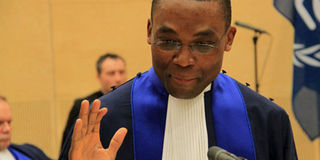Nigerian judge Chile Eboe-Osuji elected as ICC president

Judge Chile Eboe-Osuji. He has been elected the new ICC president. PHOTO | FILE | NATION MEDIA GROUP
What you need to know:
Czech Republic’s Judge Robert Fremr, who also sat in the Ruto and Sang cases, was elected first vice president to take over from Judge Aluoch as French Judge Marc Perrin de Brichambaut took over from Judge Kuniko Ozaki as second vice president.
In his acceptance speech, judge Osuji pledged to enhance cooperation among The Hague-based court’s stakeholders in order to strengthen it.
Nigerian Judge Chile Eboe-Osuji has been elected president of the International Criminal Court (ICC) for a three-year term.
The judge, who presided over post-election violence cases against Deputy President William Ruto and former radio journalist Joshua Sang, takes over from Judge Silvia Fernández de Gurmendi whose term has ended.
KENYAN
According to a statement sent to newsrooms, ICC judges elected a new leadership during a plenary on Sunday, which will also see Kenyan Judge Joyce Aluoch bow out as vice president after serving in the capacity since 2015.
Mr Osuji pulled out of President Uhuru Kenyatta’s post-election violence case in 2014.
Czech Republic’s Judge Robert Fremr, who also sat in the Ruto and Sang cases, was elected first vice president to take over from Judge Aluoch as French Judge Marc Perrin de Brichambaut took over from Judge Kuniko Ozaki as second vice president.
In his acceptance speech, judge Osuji pledged to enhance cooperation among The Hague-based court’s stakeholders in order to strengthen it.
“I am deeply honored to have been elected by my peers as president of the International Criminal Court. I look forward to working together with (the new leadership) as well as with all the judges, all the officials and the staff of the court in a spirit of collegiality,” said Mr Osuji.
FUNCTIONS
He added: “I also look forward to collaborating with the Assembly of States Parties, civil society and the international community at large, acting together to strengthen and reinforce the Rome Statute system.”
According to the ICC, its presidency is responsible for the proper administration of the court, with the exception of the Office of the Prosecutor, which is independent.
Its functions include overseeing the court’s registry and conducting judicial review of certain decisions of the registrar, besides implementing the court’s cooperation agreements with states and international organisations.





